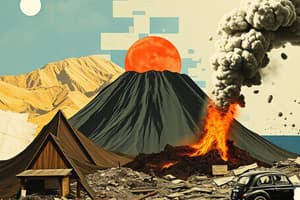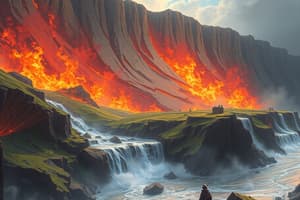Podcast
Questions and Answers
What is a geological hazard?
What is a geological hazard?
A condition or event that may cause harm to property and life as a result of a geological process.
What causes earthquakes?
What causes earthquakes?
- Weather changes
- Human activities
- Release of energy from accumulated stress along geologic faults (correct)
- Volcanic activity (correct)
Ground shaking only affects buildings that are directly on fault lines.
Ground shaking only affects buildings that are directly on fault lines.
False (B)
What is liquefaction?
What is liquefaction?
Which of the following is NOT an earthquake hazard?
Which of the following is NOT an earthquake hazard?
What may happen during a tsunami caused by an earthquake?
What may happen during a tsunami caused by an earthquake?
Flashcards are hidden until you start studying
Study Notes
Geological Hazards Overview
- Geological hazards refer to conditions or events that pose risks to life and property due to geological processes like earthquakes, volcanic eruptions, and landslides.
Earthquake
- Earthquakes result from the sudden release of energy along geological faults or due to volcanic activity.
- Consequences of earthquakes include building collapses, tsunamis, landslides, and changes to the ground level.
Earthquake Hazards
-
Ground Shaking:
- Vibration of the land surface during an earthquake.
- Intensity is influenced by the earthquake's magnitude and distance from the epicenter.
- Can lead to partial or total building collapses.
-
Ground Displacement:
- Involves the horizontal or vertical movement of the ground along fault zones.
- Affects a smaller area but can severely damage nearby structures.
-
Liquefaction:
- Process in which solid soil or rock is transformed into a liquid-like state during ground shaking.
- Causes large structures to tilt or sink into the liquefied ground.
-
Tsunami:
- A series of long, high ocean waves triggered by seismic activity beneath the sea.
- Results in coastal flooding and significant destruction of property.
-
Fire:
- Can occur due to ruptured gas lines from ground shaking or displacement.
- Increases the risk of explosions and poses a threat to life and property.
Risk Management
- Understanding and identifying hazard-prone areas through hazard mapping is crucial for disaster preparedness.
- Practical coping mechanisms include community planning and constructing resilient infrastructure to mitigate potential damage.
- Human activities, such as deforestation and construction on unstable slopes, can exacerbate the risk of landslides, emphasizing the need for sustainable practices.
Studying That Suits You
Use AI to generate personalized quizzes and flashcards to suit your learning preferences.




